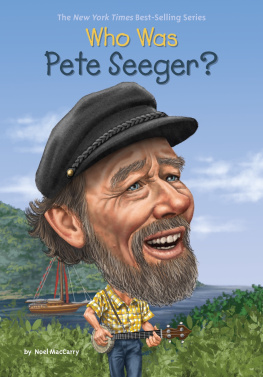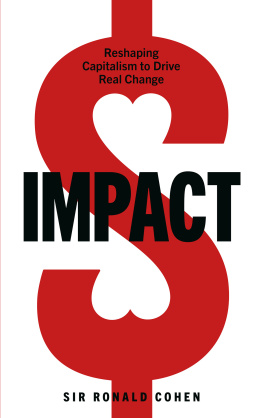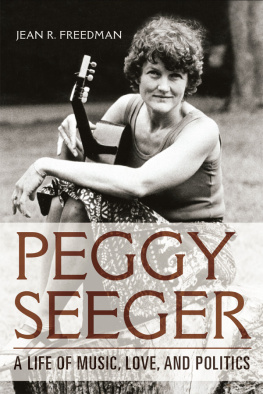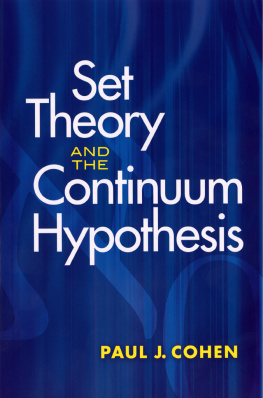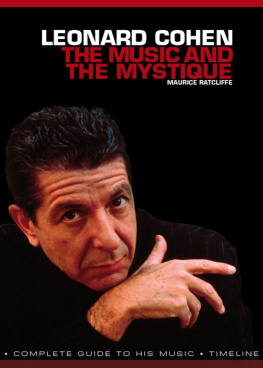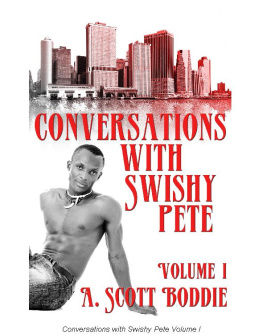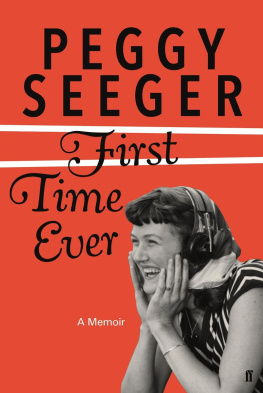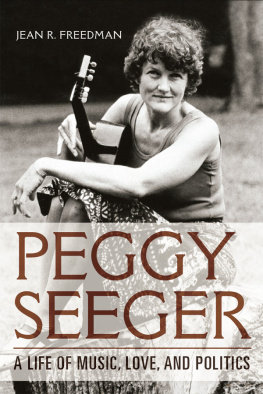Ronald D. Cohen - The Pete Seeger Reader
Here you can read online Ronald D. Cohen - The Pete Seeger Reader full text of the book (entire story) in english for free. Download pdf and epub, get meaning, cover and reviews about this ebook. year: 2014, publisher: Oxford University Press, USA, genre: Art. Description of the work, (preface) as well as reviews are available. Best literature library LitArk.com created for fans of good reading and offers a wide selection of genres:
Romance novel
Science fiction
Adventure
Detective
Science
History
Home and family
Prose
Art
Politics
Computer
Non-fiction
Religion
Business
Children
Humor
Choose a favorite category and find really read worthwhile books. Enjoy immersion in the world of imagination, feel the emotions of the characters or learn something new for yourself, make an fascinating discovery.

- Book:The Pete Seeger Reader
- Author:
- Publisher:Oxford University Press, USA
- Genre:
- Year:2014
- Rating:3 / 5
- Favourites:Add to favourites
- Your mark:
- 60
- 1
- 2
- 3
- 4
- 5
The Pete Seeger Reader: summary, description and annotation
We offer to read an annotation, description, summary or preface (depends on what the author of the book "The Pete Seeger Reader" wrote himself). If you haven't found the necessary information about the book — write in the comments, we will try to find it.
The Pete Seeger Reader — read online for free the complete book (whole text) full work
Below is the text of the book, divided by pages. System saving the place of the last page read, allows you to conveniently read the book "The Pete Seeger Reader" online for free, without having to search again every time where you left off. Put a bookmark, and you can go to the page where you finished reading at any time.
Font size:
Interval:
Bookmark:
THE PETE SEEGER READER
Readers on American Musicians
Scott DeVeaux, Series Editor
Edited by Ronald D. Cohen and James Capaldi


Oxford University Press is a department of the University of Oxford.
It furthers the Universitys objective of excellence in research,
scholarship, and education by publishing worldwide.
Oxford New York
Auckland Cape Town Dar es Salaam Hong Kong Karachi
Kuala Lumpur Madrid Melbourne Mexico City Nairobi
New Delhi Shanghai Taipei Toronto
With offices in
Argentina Austria Brazil Chile Czech Republic France Greece
Guatemala Hungary Italy Japan Poland Portugal Singapore
South Korea Switzerland Thailand Turkey Ukraine Vietnam
Oxford is a registered trade mark of Oxford University Press
in the UK and certain other countries.
Published in the United States of America by
Oxford University Press
198 Madison Avenue, New York, NY 10016
Oxford University Press 2014
All rights reserved. No part of this publication may be reproduced, stored in a retrieval system, or transmitted, in any form or by any means, without the prior permission in writing of Oxford University Press, or as expressly permitted by law, by license, or under terms agreed with the appropriate reproduction rights organization. Inquiries concerning reproduction outside the scope of the above should be sent to the Rights Department, Oxford University Press, at the address above.
You must not circulate this work in any other form,
and you must impose this same condition on any acquirer.
Library of Congress Cataloging-in-Publication Data
The Pete Seeger reader / edited by Ronald D. Cohen
and James Capaldi.
pages cm.(Readers on American musicians)
Includes bibliographical references and index.
ISBN 9780-19-986201-6 (alk. paper)
1. Seeger, Pete, 1919Criticism and interpretation.
I. Seeger, Pete, 1919II. Cohen, Ronald D., 1940, editor.
III. Capaldi, James, editor.
ML420.S445P48 2014
782.42162130092dc23 2013039112
9 8 7 6 5 4 3 2 1
Printed in the United States of America
on acid-free paper
FOR
TOSHI SEEGER (19222013)
Therese, Mary-Therese, Gabrielle, James, Christopher, Emily Capaldi
Nancy, Joshua, and Alysha Cohen
PART I
Background
PART II
The Early Years
PART III
The 1950s
PART IV
The 1960s
PART V
The 1970s and After
No one can prove how important music is, but people in power believe it is, and they try to control it, Pete Seeger (b. May 3, 1919) wrote in 2010 as the Foreword to the childrens book We Shall Overcome: A Song That Changed the World. The power of singing together shows us that change is possible. In Beacon, New York, where I live, adults and children gather every year for a big block party called The Spirit of Beacon Day. There are people from different religions and different cultures speaking many different languages. There is singing, dancing, and eating. It is a hopeful event for everyone and music helps to bring us together. This approach gives a good sense of one of the central threads in Seegers long, complex public lifehis optimism and promotion of folk singing throughout the worldwhich we have tried to capture through the discussions and documents in The Pete Seeger Reader. It has been a life filled with triumphs and pitfalls, but throughout he has struggled to be primarily a teacher as well as a performer and political organizer.
In 1991 Pete journeyed to Havana, Cuba, to receive that countrys highest award, the Felix Varela Medal. Three years later President Bill Clinton bestowed on him the National Medal of the Arts as well as a Kennedy Center Award during a nationally televised ceremony in the nations capital. In 1996 Pete was inducted into the Rock and Roll Hall of Fame in Cleveland, the same year that his CD Pete garnered a Grammy Award for Best Traditional Folk Album. Three years earlier he captured a Grammy Lifetime Achievement Award. The Grammy awards kept coming, in 2009 with At 89, also for Best Traditional Folk Album, then two years later when Tomorrows Children captured honors for the Best Musical Album for Children. As Pete had come from a long line of New England aristocratshis father, Charles, was a gifted musicologist who had pioneered the field of ethnomusicology, and his mother, Constance de Clyver Edson, was a talented violinistand had attended Harvard College, such awards might have seemed natural and fitting. But this was not always the case. Pete had dropped out of Harvard during his second year, 1938, and never looked back. For the next seven-plus decades he would follow his musethe banjo, folk music, and activist politicsin the process becoming the countrys (even the worlds) most famous folk performer as well as political activist. The road, however, was a rough one.
The basic outlines of Petes story have been told, particularly by his biographer David King Dunaway in How Can I Keep from Singing? The Ballad of Pete Seeger (first published in 1981, then expanded and updated in 2008). Two shorter biographies have also appeared: Allan M. Winkler, To Everything There Is a Season: Pete Seeger and the Power of Song (2009) and Alec Wilkinson, The Protest Singer: An Intimate Portrait of Pete Seeger (2009). Jim Browns wonderful documentary film, Pete Seeger: The Power of Song (Genius Products, 2008), captures much of the story. David King Dunaways three-hour radio series Pete Seeger: How Can I Keep from Singing? is also helpful. Dunaway has catalogued, as much as possible, Seegers amazing list of recordings in A Pete Seeger Discography: Seventy Years of Recordings (2010). Pete has not only recorded hundreds of folk songs, old and new, foreign and domestic, but also the Folkways albums The Nativity, Traditional Christmas Carols, and Jewish Childrens Songs and Games, as well as the Phillips release The Birth: Story of the Nativity by Scholem Asch. As for Seegers own writings, he has published various editions of Where Have All the Flowers Gone: A Singalong Memoir, starting in 1993, the latest in 2009, which includes much autobiographical information as well as the lyrics to hundreds of his songs. We have, therefore, included no song lyrics. Many of his pre-1970 writings were collected and published by Jo Metcalf Schwartz, ed., in The Incompleat Folksinger by Pete Seeger (1972), including his columns for Sing Out!, titled Johnny Appleseed, Jr., which began in the fall 1954 issue: This column is dedicated to Johnny Appleseed, Jr.,the thousands of boys and girls who today are using their guitars and their songs to plant the seeds of a better tomorrow in the homes across our land . For if the radio, the press, and all the large channels of mass communication are closed to their songs of freedom, friendship and peace, they must go from house to house, from school and camp to church and clambake. Most recently, Rob Rosenthal and Sam Rosenthal have edited Pete Seeger in His Own Words (2012), a broad collection of his writings, many previously unpublished and drawn from Petes private collection.
In November 2002 Pete wrote me (Ron Cohen) a letter, commenting on my book Rainbow Quest: The Folk Music Revival and American Society. 19401970 (2002). After some initial comments, mostly positiveI learned a lot of things I never knew. And of the things I knew, I believe you got a B+, sometimes an A+)he helpfully concluded: Im sorry you didnt give more space to women: Malvina [Reynolds], Holly Near, & my stepmother Ruth. And Faith Petric! The steady (if slow) proliferation of clubs, publications, venues (including festivals), songwriters, & home music is THE important thing, and not the fame or fortune of any of us professionals! Not that the latter are unimportant. Arlo Guthrie and City of New Orleans have inspired millions, I believe. For someone who has been in the public eye since 1939, he had a telling point, but it is consistent with Seegers lifelong pursuit of being an educator, as well as his success as an entertainer, song writer, and political activist. His organizing skills began with the formation of the Almanac Singers in 1941, continued after the war with Peoples Songs and Peoples Artists, the Weavers in 1949, then
Next pageFont size:
Interval:
Bookmark:
Similar books «The Pete Seeger Reader»
Look at similar books to The Pete Seeger Reader. We have selected literature similar in name and meaning in the hope of providing readers with more options to find new, interesting, not yet read works.
Discussion, reviews of the book The Pete Seeger Reader and just readers' own opinions. Leave your comments, write what you think about the work, its meaning or the main characters. Specify what exactly you liked and what you didn't like, and why you think so.

